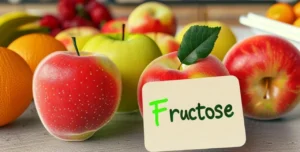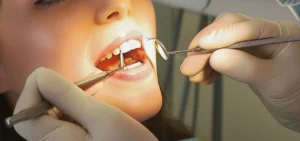Sugar is a ubiquitous part of modern diets, found in everything from sodas to cereals to condiments. While it may satisfy our sweet cravings, sugar’s impact on our oral health is far from sweet.
In this comprehensive guide, we’ll explore the effects of sugar on teeth, common foods high in sugar, types of sugar, and strategies to mitigate its harmful effects.
How Sugar Affects Teeth:

When we consume sugary foods and beverages, the bacteria in our mouths feed on the sugars and produce acids as a byproduct. These acids attack the enamel—the protective outer layer of our teeth—causing it to weaken and erode over time. This process, known as demineralization, can lead to tooth decay, cavities, and eventually, tooth loss if left untreated.
Furthermore, the bacteria in our mouths form plaque—a sticky film that adheres to the teeth—where they continue to thrive and produce acids. If plaque is not removed through proper oral hygiene practices such as brushing and flossing, it can harden into tartar, further exacerbating tooth decay and gum disease.
Common Foods High in Sugar:
While sugar is present in many foods and beverages, some are particularly high in sugar content. These include:
Sodas and Sugary Drinks:
Sodas, fruit juices, energy drinks, and sports drinks are notorious for their high sugar content and acidity, making them especially harmful to tooth enamel.
Candies and Sweets:
Candies, chocolates, cookies, cakes, and other sweets are packed with sugar and often sticky, adhering to the teeth and promoting bacterial growth.
Processed Foods:
Many processed foods such as breakfast cereals, flavored yogurts, granola bars, and condiments contain added sugars to enhance flavor and prolong shelf life.
Fruit:
While fruits are nutritious and contain natural sugars, they can still contribute to tooth decay if consumed in excess, especially dried fruits and fruit juices.

Starchy Foods:
Starchy foods such as bread, crackers, and potato chips can break down into sugars in the mouth, providing fuel for bacteria to produce acids.
Types of Sugar:
Sugar comes in various forms, each with its own effects on dental health:
Sucrose:
Also known as table sugar, sucrose is the most common type of sugar found in our diets. It is derived from sugar cane or sugar beets and is used as a sweetener in many foods and beverages.
Fructose:
Fructose is a natural sugar found in fruits, honey, and some vegetables. While it is less likely to cause tooth decay than sucrose, it can still contribute to oral health problems if consumed in excess.
Glucose:
Glucose is a simple sugar that is a primary source of energy for the body. It is found in carbohydrates such as bread, pasta, and rice, as well as in fruits and vegetables.

High-Fructose Corn Syrup (HFCS):
HFCS is a sweetener made from corn starch and is commonly used in processed foods and beverages. It is similar in composition to sucrose but is often cheaper and sweeter.
Mitigating the Effects of Sugar on Teeth:
While it may be challenging to eliminate sugar entirely from our diets, there are steps we can take to minimize its impact on our oral health:
Practice Good Oral Hygiene:
Brush your teeth twice a day with fluoride toothpaste, floss daily, and visit your dentist regularly for checkups and cleanings to remove plaque and prevent tooth decay.
Limit Sugary Foods and Drinks:
Reduce your consumption of sugary foods and beverages, especially between meals. Opt for water or unsweetened beverages instead, and choose fresh fruits over processed sweets.
Rinse Your Mouth:
After consuming sugary foods or drinks, rinse your mouth with water to help wash away sugars and acids and neutralize pH levels.

Use Sugar Substitutes:
Consider using sugar substitutes such as xylitol or stevia in place of regular sugar in cooking and baking, as they are less likely to promote tooth decay.
Chew Sugar-Free Gum:
Chewing sugar-free gum after meals can help stimulate saliva production, which can neutralize acids and wash away food particles.
In conclusion, sugar can have a significant impact on our oral health, contributing to tooth decay, cavities, and gum disease. By understanding how sugar affects teeth, being mindful of our sugar intake, and adopting good oral hygiene habits, we can protect our smiles and enjoy better dental health for years to come. For personalized advice on maintaining a healthy smile, schedule a dental consultation with Dr. Veners today.






